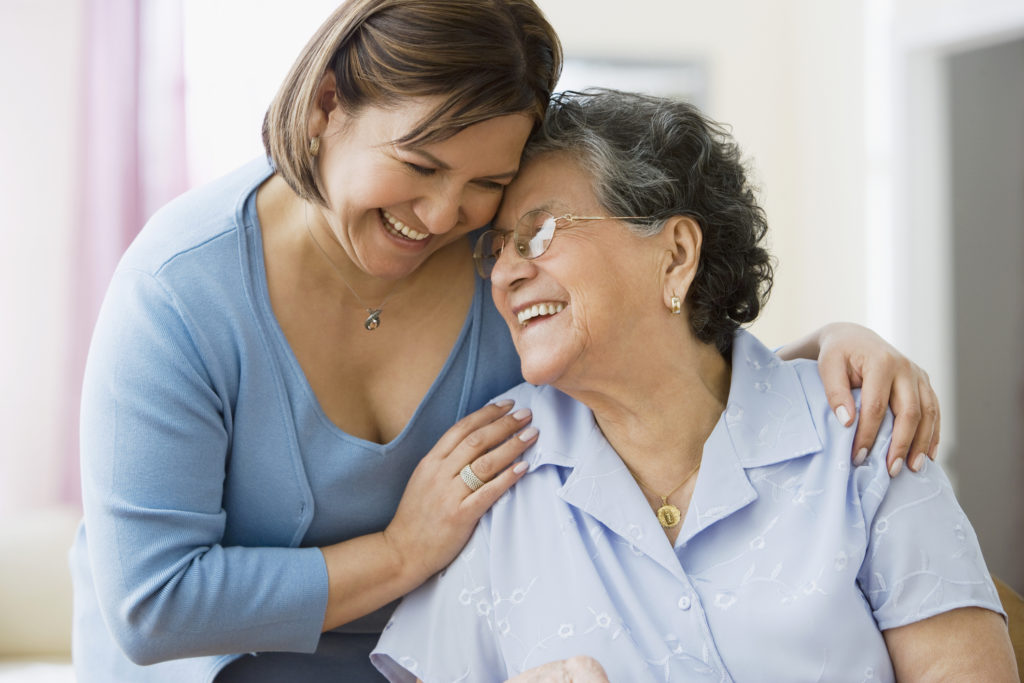There’s nothing better than coming home for the holidays and reconnecting with long-distance loved ones. Spending time with family is what makes the holidays so special and memorable!
If it’s been a while since you last saw your senior parents in person, visiting also presents an opportunity for a “holiday check-in,” allowing you to observe Mom or Dad in their living situation and look for clues that indicate they may need some extra help.
While you’re home for the holidays, keep an eye out for these signs that Mom or Dad’s needs have changed and additional care is required.
#1: Changes in appearance
First, it’s important to make note of any decline in your parent’s appearance, which may indicate they need assistance with their daily routine. When you give Mom or Dad a hug, what do you notice?
- Unintentional weight gain or loss. Significant weight changes could be a sign of poor nutrition or an underlying medical condition. Ask your parent if they’re still managing grocery shopping and meal preparation on their own, or if they could use some help. Peeking in their fridge and pantry can also tell you if they’re eating a well-balanced diet.
- Clothing and style. Pay attention to your loved one’s attire. Are their clothes clean? Are they wearing appropriate clothing for the weather and occasion?
- Changes in hygiene and grooming. A noticeable decline in your loved one’s personal hygiene and grooming is a clear sign that they need some extra help caring for themselves. For example, cognitive impairment or mobility problems can make showering difficult. If your loved one has trouble driving, they may not be visiting the barbershop or salon as frequently. Social isolation may also contribute to an unkempt appearance.
#2: Changes in mood and personality
In addition to observing your parent’s physical appearance, pay attention to their mood. Asking a few key questions can reveal if your parent is happy and active, or experiencing loneliness and isolation.
- Are they still involved in the hobbies that bring them joy? A lack of interest or excitement in favorite activities — including holiday activities — could be a warning sign that help is needed.
- How often do they socialize with others? What are their friends up to?
- Have they experienced any sadness, moodiness, decreased energy, or problems sleeping, especially as the seasons change? The “winter blues” can be especially prevalent among seniors, and may lead to depression and other serious concerns.
If Mom or Dad have been unusually withdrawn, irritable, or down lately, it could be time to intervene. Mood swings and personality changes can be common symptoms of Alzheimer’s disease or dementia.

#3: Balance problems
During your holiday visit, watch how your parent walks and moves around the home. Are they shuffling their feet when they walk or using walls and furniture to brace themselves? Are they unsteady on their feet when standing too long? Do they sit for long periods of time because it’s difficult for them to rise from a chair? Problems with balance, coordination, and mobility put older adults at an increased risk of falling. While falls are common, they can be prevented with interventions such as balance and strength exercises, physical therapy, home modifications, and assistive devices.
#4: Unsafe home environment
Simply looking around your parent’s home can reveal a lot about their health, safety, and overall well-being. Are they having trouble keeping up with household chores and maintenance? A few things to look for include stacks of unopened mail and past-due bills, expired food, neglected yard work, overflowing dishes or laundry, and piles of clutter. If your parent’s home is not up to their usual standards, it could indicate they need a helping hand.
#5: Frequent memory lapses
Everyone experiences memory slips from time to time. We’ve all misplaced our keys, missed appointments, or forgotten someone’s birthday. It’s also natural for older adults to become a little more forgetful with age. But if your aging parent is beginning to have frequent memory lapses and confusion that interferes with their daily life, don’t ignore your concerns. These could be early signs of Alzheimer’s disease or dementia.
Thankfully, there are many ways to seek help and support for loved ones experiencing cognitive decline. For example, if your loved one consistently forgets to take their medication on time, or has trouble remembering to fill multiple prescriptions, at-home medication management services will provide the help they need. Assisted living memory care is another option for seniors in the early to mid-stages of dementia who need support with day-to-day activities, helping to enhance their quality of life and maintain their independence as long as possible.
Choosing the Right Time to Talk
Any one of these signs can be worrisome, especially if you haven’t seen your parent in a long time. However, your family’s holiday gathering may not be the ideal setting for bringing up your concerns and trying to find a solution. It’s a good idea to talk things over with siblings or other family members after the holidays when you’ll have fewer distractions and more time to come up with a plan.
Start by asking your parents how they’re really doing at home. Explain what you observed and find out if they’re open to at-home health care or an assisted living community. Navigating conversations about the future can be difficult for everyone involved, but it’s important to discuss senior care options early and often. Many families find themselves delaying important decisions until an accident or emergency occurs. By starting early, you and your family will have plenty of time to research the options, understand your parent’s wishes and preferences, and make a confident decision together!
When you’re ready to learn more about at-home health care services and assisted living at Bethany Village, please contact us. We’re always happy to help you explore the options available to you and answer any questions you may have!

